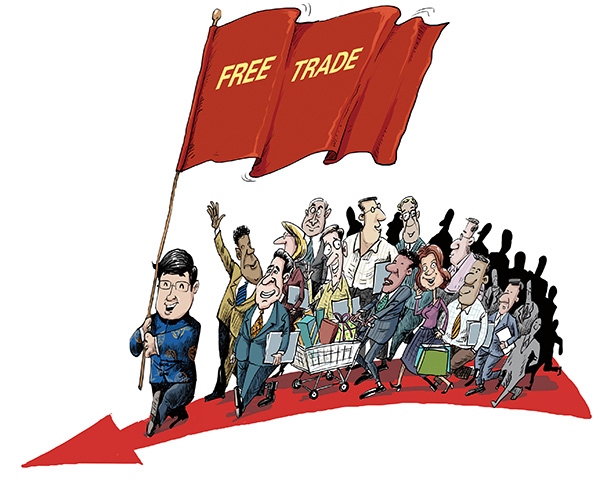INSIGHTS
Free Trade and “The Donald” – Part Three


A Firstline Securities Limited Blog by: Mike
Image Courtesy: View Link
Introduction
In the final part of our series of blog entries on free trade and the policies in this area of the current administration of Donald Trump, we look at the arguments for and against free trade.
As you read this blog entry you should become aware that there are valid arguments for protectionism, but those arguments often relate to specific situations that are not currently found nor faced by the United States.
The revenue argument
Developing nations often lack the institutional infrastructure required for the imposition and efficient collection of income tax, corporation tax, and value added tax (VAT).
To finance national expenditure, governments of developing nations may resort to the imposition of tariffs since tariffs are comparatively easy to administer and collect.
However, the imposition of tariffs can often turn out to be a double-edged sword.
If a developing nation attempts to increase the income derived from the imposition of tariffs by increasing the tariff-rate charged, the price of the imports may increase to such an extent that demand falls, and the resulting income from tariffs also may fall.
The protection of domestic industry argument
Imposition of tariffs in order to protect domestic industry is one of the most popular arguments for the imposition of tariffs on imports.
The argument is a simple one: the imposition of tariffs is essential for the survival of the domestic industry.
Most economists debunk this argument because they embrace the theory of “comparative advantage”. This group of economists is often referred to colloquially as “globalists”.
The theory of comparative advantage suggests that an industry in need of the protection of tariffs should not survive and that the resources employed in that industry ought to be transferred to alternatives where the country has a comparative advantage.
This is an emotive issue.
Often job losses are involved, and it may not be possible to replace those job losses in the same geographic area.
The theory of comparative advantage ignores the emotive issue by arguing that the welfare gains of the citizens taken as a whole would outweigh the loss of those citizens directly affected by free trade competition.
In other words – it’s a harsh and brutal world especially for those that lose their jobs with little hope of finding a replacement locally. There are some parallels to the situation in respect of the Petrotrin refinery here.
Globalists are often blamed for the decline of the “Rust States” in the United States (those areas that have suffered extensive deindustrialisation).
The infant industry protection argument
Those that argue that infant industries require protection contend that the costs infant industries incur fall as their operations expand as a direct result of economies of scale. While they are growing, their cost structure may make them “uncompetitive” on an international level.
To protect the infant industry during this development stage, the imposition of tariffs can protect the domestic market until cost efficiencies are realised and the infant industry has matured to an extent that it can compete internationally.
There is a counter-position to this view: by the closing of international markets, the imposition of tariffs severely restricts the ability of international firms to gain economies of scale by exporting to closed-off economies protected by tariffs.
This is a position also advanced by Globalists.
The unemployment argument
Tariffs are often promoted as a mechanism for protecting jobs.
Many economists doubt that tariffs are effective at promoting employment, arguing that they simply export unemployment. This means that any rise in domestic employment is countered by a rise in international unemployment.
But this is only part of the problem. Countries affected by the imposition of a tariff may respond by imposing retaliatory tariffs which can counter any benefit achieved domestically by the imposition of the original tariff.
The “autarky” argument
If you are wondering what “autarky” means, then the following defines that term in its purest form.
Autarky can be defined as the quality of being self-sufficient and the term is usually applied to specific political states or their economic systems.
Autarky exists whenever a company or country can survive or continue its activities without external assistance or international trade.
If a self-sufficient economy also refuses all trade with the outside world then it can quite rightly be referred to as a closed economy.
Autarky in its purest form is impossible to achieve. In simple terms, no modern nation, regardless of how rich or how well-endowed it may be in natural resources, could practice self-sufficiency and thrive.
The national defence argument
A common argument used to promote the imposition of tariffs is that the survival of a key strategic industry is required in order to promote the national interest. This argument is the genesis of the Trump tariffs under section 232 of the Trade Expansion Act of 1962.
There is a simple counter to this argument.
If supporting an industry is key to the national interest, then those industries should be given direct incentives and tax breaks in order to allow them to meet foreign competition and survive.
In such a situation, the subsidy or tax incentive granted is the price paid by the nation as a whole to maintain the industry in the interest of national defence or security.
The balance of payments argument
The balance of payments is a statement of all transactions made between entities in one country and the rest of the world over a defined period of time. Balance of payments data is usually produced on a quarterly or yearly basis.
Trade imbalances can and do appear between different countries’ current accounts.
According to the World Bank, the United States had the world’s largest current account deficit in 2016 ($481.2 billion), while Germany had the world’s largest surplus ($289.2 billion).
Trade imbalances can and do generate tensions between countries.
Donald Trump campaigned on a platform of reversing the U.S.’s trade deficits, particularly with Mexico and China.
Trade surpluses are equally unpopular in some quarters.
The Economist Magazine argued in 2017 that Germany’s surplus put “unreasonable strain on the global trading system, since “to offset such surpluses and sustain enough aggregate demand to keep people in work, the rest of the world must borrow and spend with equal abandon.”
Looking at balance of payments on a nation-by-nation basis: if one nation runs into balance of payments difficulties because it runs a high deficit that it cannot finance, pressure will be placed on that nation’s foreign reserves.
In the case of extreme balance of payments problems this can lead to devaluation.
But this is often an unpopular political step. To avoid a potential devaluation, a nation may try to redress its balance of payments difficulties by restricting imports through the imposition of tariffs.
What are your thoughts on tariffs?
Send us your comments – we’d love to read your opinion. Even better, if we get differing views because we like nothing better than a debate!
Other than debating, we offer comprehensive coverage of local and international markets with many unique opportunities to put surplus cash to work either as your asset manager or investment advisor. Please contact us for more details at info@firstlinesecurities.com or at 868.628.1175. We can discuss your investment needs in detail and craft a portfolio that makes sense for you. We look forward to hearing from you.

